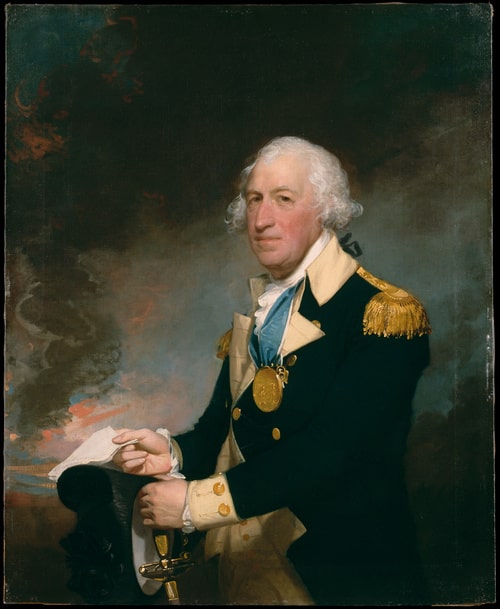Contents

Contents
Quick facts
- Born: 26 July 1727 in Maldon, Essex, England.
- Horatio Gates was a British-born military leader who served as a general in the Continental Army during the American Revolutionary War.
- He is best known for his victory at the Battle of Saratoga in 1777, which was a turning point in the war due to its influence on French support for the American cause.
- Gates served as the President of the Board of War in 1778, playing a vital role in the administrative and logistical aspects of the Continental Army.
- He faced criticism and controversy for his role in the Conway Cabal, an alleged plot to replace George Washington as commander-in-chief.
- His later military career suffered a setback after the defeat at the Battle of Camden in 1780, where his leadership was questioned.
- Gates was known for his advocacy of merit over social status in military appointments, aligning with the egalitarian ideals of the revolution.
- After the war, he freed his slaves and relocated to New York, where he lived out his remaining years and served in the state legislature.
- Died: 10 April 1806 in New York.
- Buried in the churchyard at Trinity Church, New York. The location of his grave is unknown, but a plaque dedicates his burial there.
Biography
Horatio Gates, American general, was born at Maldon in Essex, England, in 1728. He entered the English army at an early age, and was rapidly promoted. He accompanied General Braddock in his disastrous expedition against Fort Duquesne in 1755, and was severely wounded in the battle of 9 July — and he saw other active service in the Seven Years’ War.
After the peace of 1763 he purchased an estate in Virginia,where he lived till the outbreak of the War of Independence in 1775, when he was named by Congress adjutant-general. In 1776 he was appointed to command the troops which had lately retreated from Canada, and in August 1777, as a result of a successful intrigue, was appointed to supersede General Philip Schuyler in command of the Northern Department.
In the two battles of Saratoga his army defeated General Burgoyne, who, on 17 October, was forced to surrender his whole army. This success was, however, largely due to the previous maneuvers of General William Schuyler and to Gates’s subordinate officers.
The intrigues of the so-called Conway Cabal
to replace George Washington with Gates completely failed. Gates was president for a time of the Board of War, and in 1780 was placed in chief command in the South. He was totally defeated at Camden, South Carolina, by Cornwallis on 17 August 1780, and in December was replaced by General Nathanael Greene, though an investigation into his conduct terminated in acquittal (1782).
He then retired to his Virginian estate, then moved to New York in 1790, after emancipating his slaves and providing for those who needed assistance. He died in New York in 1806.

